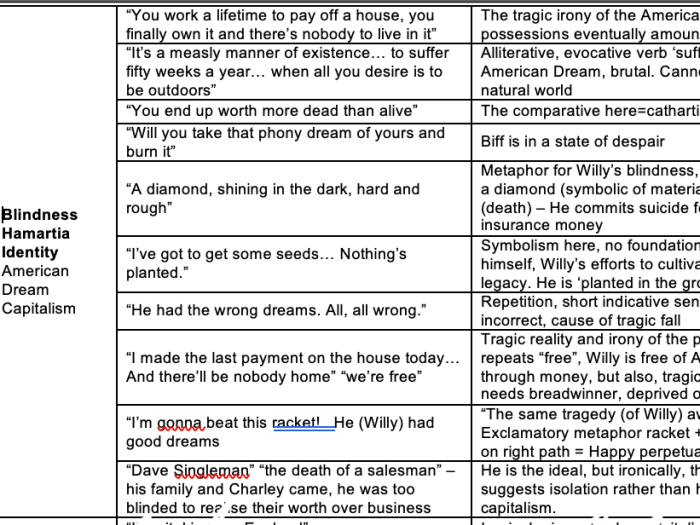Death of a salesman important quotes – Death of a Salesman, a Pulitzer Prize-winning play by Arthur Miller, is a profound exploration of the American Dream, identity, and the corrosive effects of the past. Through the lens of Willy Loman, a struggling salesman, the play offers a timeless meditation on the complexities of the human condition.
The play’s evocative language and symbolism have made it a touchstone for generations of readers and theatergoers. Its memorable quotes capture the essence of Willy’s tragic journey and illuminate the play’s central themes.
Willy Loman’s Dream and Its Destruction
Willy Loman’s life revolves around the American Dream, which he believes can be achieved through material success and social status. He aspires to become a successful salesman, believing that it will bring him the admiration and respect he craves.
The Significance of Willy’s Dream
- Provides him with a sense of purpose:Willy’s dream of success gives him direction and motivation in life. He believes that achieving it will validate his worth and bring him happiness.
- Influences his actions and decisions:Willy’s unwavering pursuit of his dream shapes his actions and choices. He prioritizes his sales career over his family and personal well-being.
- Creates a disconnect with reality:Willy’s obsession with his dream leads him to ignore the limitations and challenges of the real world. He fails to adapt to changing circumstances, which ultimately contributes to his downfall.
The Shattering of Willy’s Dream
Willy’s dream is ultimately shattered by the harsh realities of life. His sales career falters, and he loses the admiration and respect he seeks. The realization of his failure triggers a downward spiral, leading to his disillusionment and despair.
- Failed business ventures:Willy’s inability to achieve financial success through his sales career is a major blow to his dream.
- Rejection by his employer:Being fired from his job is a humiliating experience for Willy, shattering his hopes of success and security.
- Loss of self-worth:The failure of his dream erodes Willy’s self-esteem and sense of purpose. He feels worthless and insignificant.
The Role of Biff and Happy Loman
Willy’s sons, Biff and Happy, play significant roles in his pursuit of his dream. Biff, the older son, initially rejects his father’s values and dreams of a different life. However, he eventually comes to realize the importance of his father’s love and support.
- Biff’s rebellion:Biff’s rejection of his father’s dream represents a challenge to Willy’s values and beliefs.
- Happy’s conformity:Happy, the younger son, blindly follows his father’s expectations, despite his own doubts and unhappiness.
- Willy’s influence on his sons:Willy’s obsession with his dream negatively impacts his sons’ lives. Biff becomes disillusioned and lost, while Happy remains unfulfilled and dependent.
The Importance of Identity and Self-Worth: Death Of A Salesman Important Quotes
Willy Loman’s identity is inextricably linked to his job and his success. He defines his worth by his ability to provide for his family and achieve financial stability. However, when he loses his job, his sense of self-worth plummets, and he begins to question his purpose in life.Willy’s
loss of self-worth contributes significantly to his downfall. He becomes depressed and withdrawn, and he begins to lose touch with reality. He becomes increasingly obsessed with the past and his former glory days, and he is unable to accept the fact that his life is no longer what it once was.Other
characters in the play also struggle with their own identities. Biff, Willy’s eldest son, is unable to find his place in the world. He is restless and unfulfilled, and he constantly compares himself to his father, who he feels he can never measure up to.
Happy, Willy’s younger son, is more successful than Biff, but he is also unhappy. He is trapped in a dead-end job and a loveless marriage, and he feels like he is living a life that is not his own.The play explores the importance of identity and self-worth in a rapidly changing world.
It shows how the loss of a job or a sense of purpose can lead to a profound sense of despair and hopelessness.
The Role of the Family
The family plays a significant role in the development of identity and self-worth. Willy Loman’s family is dysfunctional and unhappy, and this contributes to his own feelings of inadequacy and failure. His wife, Linda, is a loving and supportive woman, but she is unable to provide him with the emotional support he needs.
His sons, Biff and Happy, are both troubled and unhappy, and they are unable to provide him with the sense of accomplishment he craves.The play shows how the family can be a source of both support and conflict. It can provide a sense of belonging and purpose, but it can also be a source of pain and disappointment.
The Failure of the American Dream

Willy Loman’s tragic story in Arthur Miller’s “Death of a Salesman” serves as a powerful critique of the American Dream, exposing its unattainability and the devastating consequences it can have on individuals.
Willy’s unwavering belief in the myth of upward mobility and economic success drives his life, but his experiences repeatedly challenge these ideals. Despite his tireless efforts, he remains a low-level salesman, struggling to make ends meet. His sons, Biff and Happy, fail to achieve the success he envisions for them, further shattering his dreams.
The Role of Society and Capitalism
Willy’s downfall is not solely a result of his personal flaws but also a reflection of the harsh realities of American society and the capitalist system.
- Materialism and Consumerism:The relentless pursuit of material wealth and the emphasis on appearances create a false sense of fulfillment, ultimately leading to Willy’s disillusionment.
- Cutthroat Competition:The capitalist system promotes intense competition, leaving little room for empathy or compassion. Willy’s inability to keep up with the demands of his job exacerbates his feelings of failure and worthlessness.
- Lack of Social Safety Net:The absence of a robust social safety net in the United States leaves individuals like Willy vulnerable to financial and emotional hardships. His desperation and inability to access adequate support contribute to his tragic end.
The Symbolism of Death
Death plays a pivotal role in Death of a Salesman, both literally and symbolically. Willy Loman’s death serves as a metaphor for the demise of his dreams and the failure of the American Dream. Through the exploration of this theme, Arthur Miller critiques the societal pressures and expectations that contribute to the disillusionment and despair of individuals like Willy.
Willy’s Death as the Death of His Dream, Death of a salesman important quotes
Willy’s pursuit of success and wealth has consumed his life, but it ultimately ends in failure. His inability to achieve his goals leaves him disillusioned and bitter. His death represents the death of his dream, as he realizes that he has lived a life unfulfilled and without meaning.
Willy’s Death as the Failure of the American Dream
Willy’s story is a cautionary tale about the dangers of blindly following the American Dream. The pressure to conform and achieve material success often leads to disillusionment and despair. Willy’s death highlights the failure of the American Dream to provide true happiness and fulfillment for those who are unable to meet its expectations.
The Impact of Willy’s Death on Others
Willy’s death has a profound impact on his family and friends. Biff, his eldest son, is deeply affected by his father’s suicide and struggles to come to terms with his own life. Happy, Willy’s younger son, is initially dismissive of his father’s death, but he eventually realizes the emptiness of his own life and the importance of finding meaning and purpose.
The Impact of the Past

Willy Loman’s past experiences, particularly his relationship with his father, have a profound impact on his present actions. His father, a successful businessman, abandoned the family when Willy was young. This abandonment left Willy with a deep sense of inadequacy and a desire to prove himself.
As a result, Willy is constantly chasing after success, even though he knows that he will never achieve the same level of success as his father.
Memories and Regrets
Willy’s memories and regrets also haunt him. He constantly relives the past, dwelling on his failures and missed opportunities. These memories prevent him from moving on and living in the present. For example, Willy often remembers the time when he was fired from his job.
This memory fills him with shame and regret, and it prevents him from finding a new job.
Flashbacks and Other Techniques
Arthur Miller uses a variety of techniques to convey the impact of the past on Willy Loman. These techniques include flashbacks, which allow the audience to see Willy’s past experiences firsthand. Miller also uses symbolism, such as the flute, to represent Willy’s lost dreams.
These techniques help the audience to understand the complex relationship between Willy’s past and present.
The Power of Language

Language plays a pivotal role in Arthur Miller’s Death of a Salesman, revealing the characters’ inner thoughts, shaping their interactions, and highlighting the complexities of human communication. Willy Loman’s use of language, in particular, provides profound insights into his mental state and the delusions that ultimately lead to his demise.
Willy Loman’s Language
Willy’s speech is characterized by its grandiosity, reflecting his inflated self-image and desire for success. He frequently employs hyperbole and exaggeration, such as claiming to have “a new continent” in his hand. However, this inflated language contrasts sharply with the reality of his life, highlighting the disconnect between his dreams and his actual circumstances.
Willy’s language also reveals his inability to communicate effectively with others. His rambling monologues and fragmented sentences often alienate his family and colleagues, leaving them confused and frustrated. This communication barrier contributes to his isolation and sense of failure.
Other Characters’ Language
The language used by other characters in the play also plays a significant role. Biff’s blunt and straightforward speech reflects his frustration with his father’s delusions and his own lack of direction. Happy’s cheerful and optimistic language, on the other hand, masks his own insecurities and the emptiness of his existence.
The contrasting language styles of the characters highlight the different perspectives and emotional states within the family. They also underscore the challenges of communication and the ways in which language can both connect and divide people.
Answers to Common Questions
What is the significance of Willy Loman’s dream?
Willy Loman’s dream of success and upward mobility is a central theme in the play. It drives his actions and ultimately leads to his downfall.
How does Willy’s loss of self-worth contribute to his downfall?
Willy’s sense of self-worth is tied to his job and his success. When he loses his job, he loses his sense of purpose and identity. This contributes to his depression and eventual suicide.
How does the play reflect the failure of the American Dream?
Willy Loman’s story is a cautionary tale about the failure of the American Dream. It shows how the pursuit of success and material wealth can come at a great cost.